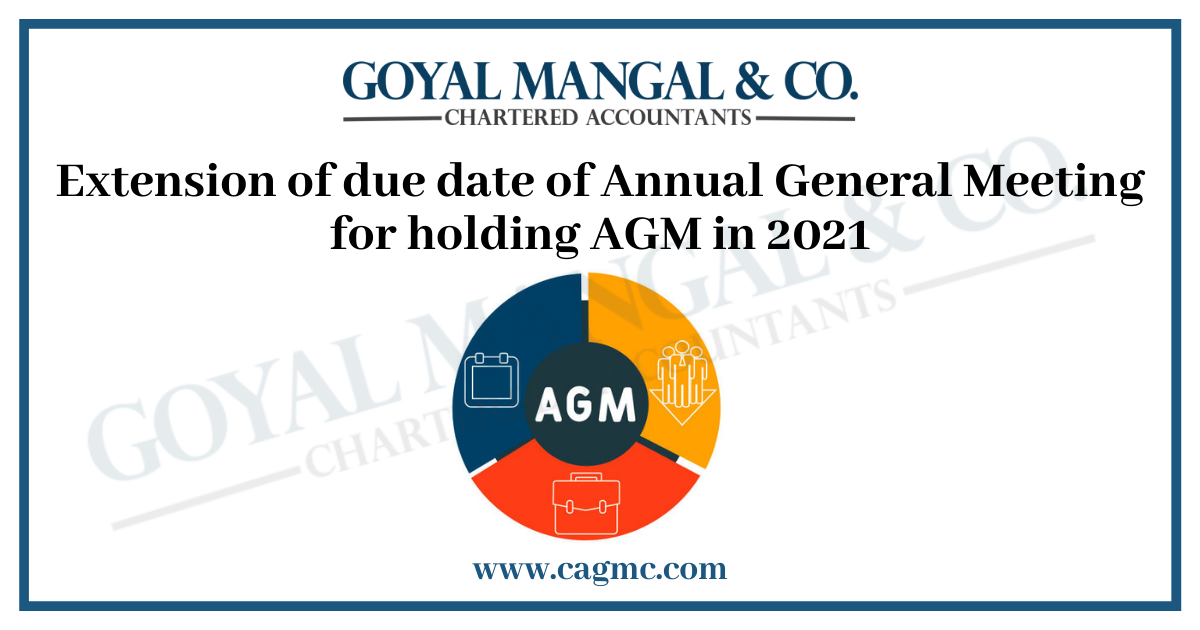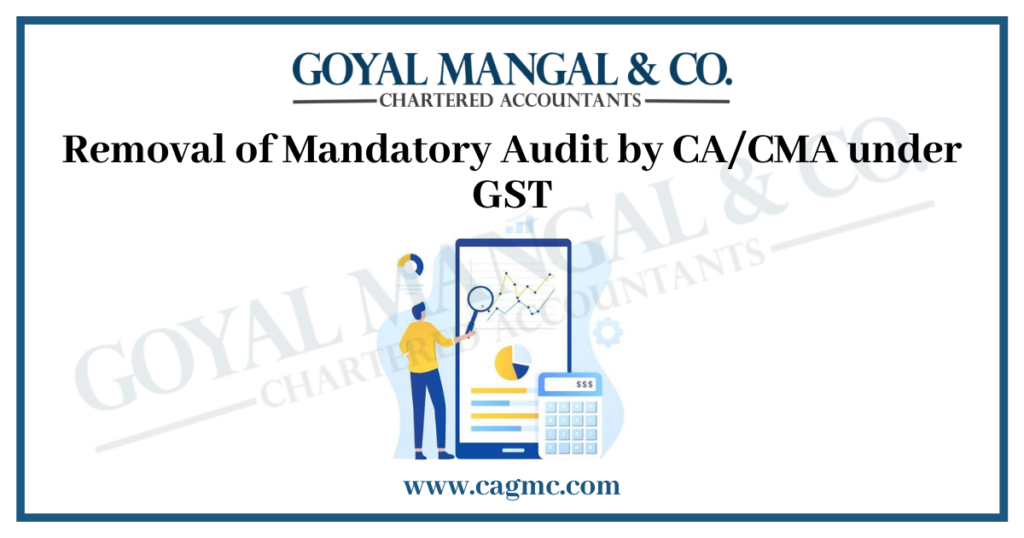
The Ministry of Corporate Affairs (“MCA”) has, in view of the representations it got for looking for extension of time for holding the Annual General Meeting (AGM) for the financial year finishing on March 31, 2021, informed the Registrar of Companies (RoC) to accord endorsement for expansion of time for holding the AGM for a time of two months past the due date by which the organizations are needed to lead the AGM for the financial year 2020-21.
| Table of Contents |
What is Annual General Meeting (AGM)?
An Annual General Meeting (AGM) under Companies Act, 2013 is an annual meeting of company’s intrigued shareholders to get, consider, endorse and embrace the Annual Financial Statements (regardless of whether independent or consolidated) ending on 31st March each year along with the Board of Directors Report and Report of the Auditors subsequently.
Different issues which are discussed in AGM are –
- Profit announcement to investors.
- Appointment of directors to supplant the resigning directors.
- Appointment of auditors and choosing the auditor’s remuneration.
Aside from the above standard business, some other business might be directed as a unique business of the organization
Annual General Meeting as per Companies Act, 2013
According to Section 96 of the Indian Companies Act, 2013, “(1) Every company other than a One Person Company shall in each year hold in addition to any other meetings, a general meeting as its annual general meeting and shall specify the meeting as such in the notices calling it, and not more than fifteen months shall elapse between the date of one annual general meeting of a company and that of the next:
Provided that in case of the first annual general meeting, it shall be held within a period of nine months from the date of closing of the first financial year of the company and in any other case, within a period of six months, from the date of closing of the financial year:
Provided further that if a company holds its first annual general meeting as aforesaid, it shall not be necessary for the company to hold any annual general meeting in the year of its incorporation:
Provided also that the Registrar may, for any special reason, extend the time within which any annual general meeting, other than the first annual general meeting, shall be held, by a period not exceeding three months.
(2) Every annual general meeting shall be called during business hours, that is, between 9 a.m. and 6 p.m. on any day that is not a National Holiday and shall be held either at the registered office of the company or at some other place within the city, town or village in which the registered office of the company is situate:
Provided that the Central Government may exempt any company from the provisions of this subsection subject to such conditions as it may impose.”
Hence, an AGM is a mandatory general meeting required to be held by all businesses except one-person company. An AGM should be held within 9 months from the end of its first financial year and all other AGMs should be held within 6 months from the end of fiscal year. It should he held on any day during business hours.
Procedure to hold Annual General Meeting (AGM)
The company should give a reasonable 21 days notice to its members for calling the AGM. Such notice should specify the place, the date and day of the meeting, time booked for meeting.
Notice is given to:
- Every one of the members from the company (counting their legal representatives of a perished individuals and assignee of a bankrupt member).
- All Directors of the Company.
- The Statutory auditor(s) of the Company.
The notice of AGM might be given recorded in writing and sent through speed post or registered post or by means of electronic mode to the address of the member according to records of the company. In the event of electronic correspondence, the notice ought to be sent to the email id address of the member.
Reasons for extension of time to hold AGM
The Registrar of Companies (RoC) can extend the time limit to hold an AGM by 90 days. The Company ought to apply for an extension in e-form GNL-1 indicating the purposes behind the extension and the period for which the company requires an extension. The RoC will record the explanations behind giving the extension.
Some of the reasons for which a company can ask for extension for holding an AGM are:
- Non-preparation of the fiscal reports because of natural calamities, because of loss of monetary data, non-presence of members because of legitimate grounds.
- Non-availability of directors on the substantial grounds
- The abrupt passing of Directors and result of this the restriction of directors goes underneath the base necessities of directors
- Because of non-signing of fiscal statements because of non-availability of Auditors because of abdication, demise, insufficiency to sign or such other legitimate explanation.
- Mergers and acquisitions
- Such other extraordinary reasons on the off chance that such reasons are legitimate and advocated.
Penalty for not holding AGM
In the event that a company fails to hold an AGM in the specified time or expansion got by it, the Tribunal may itself or on an application made by any director or member request an AGM to be led according to its directions.
On the off chance that the company further defaults in holding a meeting as per the directions of the Tribunal, the director and each official of the company who submits the default will be culpable with a fine of up to Rs 1 lakh. In the event of continuation of default, a fine of Rs 5,000 every day is collected for every day during which the default proceeds.
Extension for holding AGM in year 2021 by Ministry of Commerce
The pandemic hasn’t permitted companies to work without a hitch or hold AGM inside due dates. Notwithstanding relaxations presented by MCA to companies to hold AGMs and executive gatherings virtually, challenges brought about by Covid-19 are interesting.
Given such difficulties, companies, proficient establishments, and industry bodies made portrayals to permit extension of time for holding AGM for the year ending 31 March 2021.
Under the provisions of Section 96(1) of Companies Act, 2013 (third provision), the MCA has guided all Registrar of Companies to give an expansion of time to hold AGM for the year finished 31 March 2021 by a time of 2 months from the due date by which organizations ought to have directed their AGM.
It is quite important that the third proviso of Section 96(1) of Companies Act, 2013 awards power to the Registrar, for a specific explanation, to extend the time inside which any Annual General Meeting, other than the first Annual General Meeting, ought to be held, by a period not surpassing three months.
According to the order passed by the Ministry of Commerce, the extension is covered by:
- “Pending applications filed in form GNL-1 for the extension of AGM for the financial year ended on 31.03.2021, which are yet to be approved.
- Applications filed in form GNL-1 for the extension of AGM for the financial year ended on 31.03.2021, which were rejected.
- Applications filed in form GNL-1 for the extension of AGM for the financial year ended on 31.03.2021, where the extension approved was for a period less than Two Months.”
It was also mentioned that this extension will not be applicable to companies who had already filed an application for extension of time under Form GNL-1 and were granted extension for more than 2 months.
Final Word
Since the Ministry of Commerce extended the dates for holding of AGM in the FY 2020-21 because of the pandemic of Covid-19. Thus, the Companies are holding up this year additionally that Ministry might extend the dates for holding of AGM for the FY 2021-22 as well. In any case, taking a gander at the current situation of the Covid-19, when everything is getting opened, it doesn’t appear to be that MoC might give any roundabout for expansion of AGM this year. Be that as it may, the Associations of CAs and CSs alongside other Industrial Associations have documented the portrayal with MCA indicating the reasons of Covid-19 and non-working of the site of the Income Tax. Albeit, these extensions shall help companies in staying compliant and avoiding penalties


